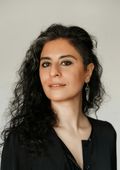A Cross-Cultural Feeling
Nominated for EUROPEAN SCREENWRITER 2008: Suha Arraf & Eran Riklis for LEMON TREE
In LEMON TREE, the newly appointed Israeli Defence Minister decides to build himself a house on the Israel-West Bank border. That makes the lemon grove on the West Bank side - owned by Salma Zidane - something of a problem. The grove is deemed to be a security risk and sealed off prior to being cut down. Salma is not so easily silenced and despite little support from the Palestinian community leaders she decides to fight for her rights and takes the matter to the Supreme Court.
Screenwriter Suha Arraf graduated from the Tel Aviv Screenwriting Academy and has worked as a journalist and directed a number of documentaries. She was born in 1969 in Mi’ilya, co-wrote THE SYRIAN BRIDE with Eran Riklis and plans to make her directorial debut in the near future.
Eran Riklis has been working in films since 1975 as a writer, producer and director. He was born in Israel in 1954, studied at the UK’s National Film and TV School and made his feature debut with ON A CLEAR DAY YOU CAN SEE DAMASCUS in 1984. The actress Hiam Abass was nominated for European Actress 2008 for her part as Salma Zidane and, in 2004, for her part in Eran Riklis’ film THE SYRIAN BRIDE.
On a foggy day in Copenhagen Suha Arraf and Eran Riklis tell us about the death of the political movie and their view on cross-cultural European movies.
What do the European Film Award nominations (for European Screenwriter and European Actress) mean for you and the film industry in Israel?
Suha Arraf: For me it is great to be nominated - the winning part is not existential.
Eran Riklis: In the category for screenwriters it is interesting - with two Italians and two Israelis! Winning or not - the important thing is that there is respect for our story. It is a matter of recognition. If you look at Israeli cinema - it is amazing what has happened in just a few years. From nowhere we are suddenly a part of the European community and it is good to be a part of a community.
From an Israeli perspective, do you see European film as a homogenous unit?
ER: For me, European films are a cinema of awareness. Somehow there is always a reflection on a situation, whether it is a specific country or Europe in general.
I think life in Europe is very dominated by a cross-cultural feeling. You go to Denmark for instance and you meet people from all over Europe. I have the feeling that the countries have no borders really and I think that this cross-cultural thing comes across in the films as well.
I don’t see it as a new tradition linked to the European Community although that has helped tearing down borders. But you can see the cross-cultural [aspect] in films by Fassbinder, in the new wave in Germany in the 1970s. And if you go back to the 1950s there was a new wave in Britain with Tony Richardson and if you go even further back you will find other waves.
Another thing is that I think the Europeans are getting better at communicating with the European audience, not only the national audience. They don’t just make small black and white arthouse productions for the few. I think Europe wants a big audience - not to earn money but to reach people.
But how can we get more people to watch European films?
ER: I think we have to accept that certain subjects are not mega popular. If I look upon LEMON TREE, it did very well in France for instance where it had 320,000 spectators - for a foreign film speaking in Arab that is very good. It has been shown everywhere and it is not huge. But I think this is the audience there is for a film like this.
People are very careful when they go to the cinema. They choose one film every month or every second month. But I have noticed something interesting. In England LEMON TREE was shown in cinemas at the same time as the new Coen Brother film (BURN AFTER READING). Both of these movies are considered arthouse movies. The Coen brothers are the more commercial side of arthouse and LEMON TREE is the more proper arthouse - but something has changed and arthouse reaches a greater audience today.
I think as well that the whole landscape of production has changed enormously over the years. Ten years ago no one would think about co-production. Before THE SYRIAN BRIDE which is 3-4 years ago, in Israel we didn’t have co-production. That helps as well to get more attention from the other countries.
And then we have to think more about distribution. We have to put more energy, money and aggressiveness into distribution. The Americans really control the cinema - they have the money and you cannot beat them but at least you can try.
What about the event here tonight - the European Film Awards have existed for 21 years. Why aren’t they as popular as the Oscars?
I think that a problem of the [European Film] Academy is that it is a little bit too professional. It is too much an industry and not a popular event. Maybe the Academy has to glam it up a little bit. People want to see beautiful women in nice dresses. And here we see the directors that we don’t know the look of.
How did your idea for LEMON TREE develop?
ER: It is based on a true story about a woman who went to court to protect her trees. And from this true story the fiction developed. But in fact the story is inspired by what happens all the time. If it is not lemon trees, it is houses; if it is not houses, it is olive trees. It is how the system works - whether people go to court or not. It is a film about the conflict between security and people. It is a universal story that applies everywhere: The conflict between the individual and the state system. This film has been shown all over the world and it is very amazing to see how people identify themselves with the movie.
The film is a consequence of a political conflict but is it political?
ER: I think today, in 2008, you cannot really make political films. You have to make human films which deal with political issues. In this film the people find themselves as targets - they are in the middle of a political conflict. In the 1970s we had the political films, for instance Costa-Gavras. I think today the world is too sophisticated, too well informed and also a little bit tired - no one really cares.
SA: I agree with you but at the same time all the movies in our category [nominated for European Screenwriter] are political movies: WALTZ WITH BASHIR, IL DIVO, and GOMORRA. To tell political stories is important. People want to see it and it sells.
ER: Yes, but no one wants to get educated. No one wants the message in the face. Of course it is political. We are not naïve, coming from Israel, and - except if you are from a little island where you drink coconut every day - I think everything is political today.
Now the Bush days are over but look how someone can make a decision in Washington and how it affects your life in China - crazy decisions are taken and it destroys the life for many people.
Can you say that is a film about awakening as well?
ER: I think a problem is that today we have no awareness and that everyone is indifferent. I talk in general and about all of us. 10,000 people get killed in Darfur and no one really cares. The next day it seems as if it was 20 years ago.
In the film the wife of the minister develops an awareness. The film begins with her looking at the grove on the other side of the fence - finding it is so beautiful. She doesn’t find it dangerous and over time she realizes that someone is living there - the grove has a life. And that the life is about a human being - a woman behind the fence engaged to the lemon trees. She begins to reflect on the situation, on the woman, and it makes her reflect on her own life too.
The two women never speak to each other but you have a feeling that something beautiful would occur if they did?
SA: My thought was that there has to be a lot of tension in this relationship. And this tension was better reached by not having them talk to each other. Instead they just watch each other. In one scene the wife of the defence minister tries to talk to Salma - but the security guy stops her. I made those choices because this is how I feel reality is. Maybe they will talk in some years - but now it is not the time.
How has it been received in the world - and how was it received in Israel?
ER: In Israel it was received very badly. The film fell between the chairs. Either people accused it of not being political enough or they accused it of being too political, or too much on the left side or not enough on the left side. But I have tried this before with my films. They don’t work in Israel but outside they work very well. I personally do not care because I don’t make films for a specific country - I make films for the world. For me there is no difference whether it is an Israeli or Japanese or Danish guy who watches the movie. Cinema is an international language.
Interviewed by Frederikke Lett in Copenhagen, December 2008









